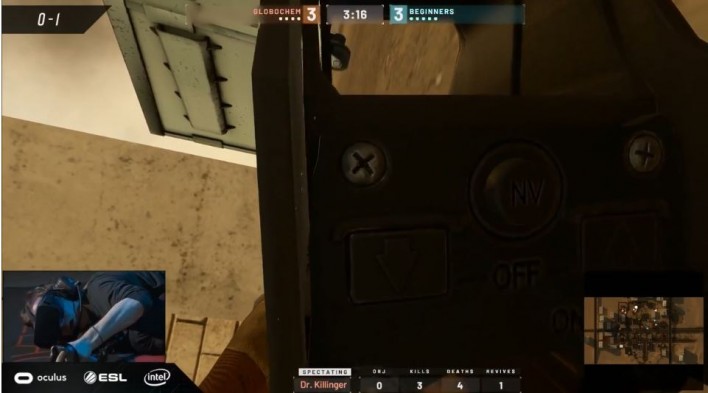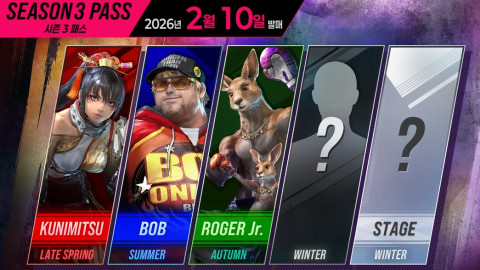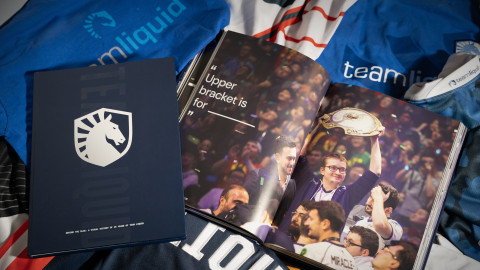
Most gamers have, at one point or another, expressed some interest or excitement in VR gaming and the potential it has to completely change the industry. However, the promise of VR games that feel like carefully crafted immersive experiences has only recently started to become a reality. Many have lost faith in VR gaming -- we were promised virtual worlds only to be given headaches and linear games.
However, the days of clunky tech-demos, grab-the-object simulators and simple rail shooters are long gone. VR games, despite some bad press, are still improving every year and their esports potential is become more and more realized; something those paying attention to VR League Onward World Finals already know.

With a $60,000 prize pool at stake, the teams competing were taking these matches seriously. As they ducked, dodged and fell prone to the ground, players appeared locked in intensive strategic combat. Some of them even holding rigs to simulate the feel and grip of actual guns to better help their aim and immersion.
The grand finals, complete with casters and an analysis deck, shows a promising future for VR esports. Developed by Downward interactive, Onward is likely the most polished and competitive ready VR FPS to date. As technology improves in both accessibility and immersive accuracy, there is no question that surreal experiences like competitive VR FPS will only become more impressive.

This video posted on Twitter shows how VR esports brings a focus on individual players, their movements and how it is all connected to the games strategic nature.
Oculus is responsible for VR League (@VRChallenger), the group that host tournaments for more VR games than just Onward. Games like Echo Combat (zero-gravity multiplayer shooter), The Unspoken (action PVP) and Sprint Vector (arcade, racing) do well in showcasing the esports potential of their respective genre and, for now, that seems to be the most important thing -- establishing that VR esports can be the future.
Poised for the future
Because the mainstream adoption of VR esports isn't happening in the present. These games simply can't compete currently with the millions of dollars players compete over every week in non-VR esports. Even if they could, VR technology currently isn't advanced or affordable enough to create the massive player bases needed to justify large esports productions and investments.
Presently, If esports audiences were to just watch Onward's gameplay alone, there wouldn't be much to talk about. The game doesn't bring anything new to squad-based combat or gritty military aesthetic.
But when fans realize that competitors aim and tactical position are entirely reliant on their real-world body movements, it's easy to feel like you have just stepped into a sci-fi movie. Watching Onward gives anyone with even the smallest amount of creativity the ability to imagine what all this might look and feel like in the next 4 years.

Visions of massive studios where star athletes jump, dive, and crawl through a real battleground synced perfectly to a competitive video game come to mind. The physicality of marksmanship and the agility of tactical maneuvers would entrance audiences and esports professionals would be tested (and admired) for a whole other dimension of gaming mastery.

The VR Dream
VR esports inherently produce a level of spectacle currently unmatched by even the most prestigious esports. They have a ways to go, but things like the Onward World Finals hint at something most gamers have, at one point or another, dreamed of. The complete immersion and celebration of gaming as the next step in human interactivity and engagement.
VR gaming is future tech that's realization will satisfy a deeply routed fantasy sci-fi geeks and nerds can't help but appreciate. It somehow seems noble to me to that developers continue to push the boundaries of what is possible in VR, despite the monumental hurdles that the platform innately has.
We aren't there yet when it comes to total immersion (will we ever be?), but VR esports is helping us get there. There is something special about watching Onward pro-players physically and mentally compete in front of a crowd of onlookers. The stakes seem higher, the competition feels relatable and teamwork becomes relevant on an emotional level.
One moment during the tournament, a player communicated with his teammate through voice chat:
"Go, Go, Go! Clear upstairs slowly -- I'll be right behind you!"
I can only imagine the level of immersion those two players felt at that moment. Competing for over $60,000, outnumbered and outgunned against cunning human opponents in a virtual war zone, suddenly the phrase "I'll be right behind you!" takes on a new meaning when playing in VR.
Would teammates playing without VR take the time to add that small (but noticeable) hint of reassurance in a shotcall? It seems that competitive Onward puts a premium on this type of trust-based communication, as vision and physical movement are limited by human constraints. Immersion, thus becomes an obstacle teammate must overcome together.
Only VR esports offer this level of immersion and it's only going to get more "real". As pro-players become more immersed in their game, viewers benefit, storylines create themselves, and esports can start attracting fans through visceral means that traditional sports have always relied on.
-

Warcraft 3 is my one true love and I will challenge anyone to a game of Super Smash Brothers Melee.
Sort by:
Comments :0





